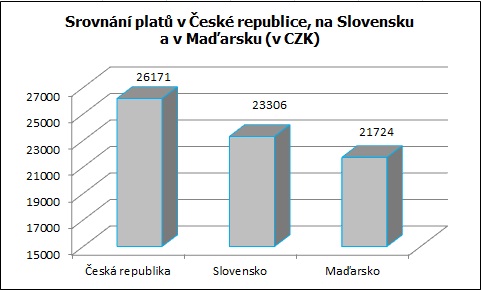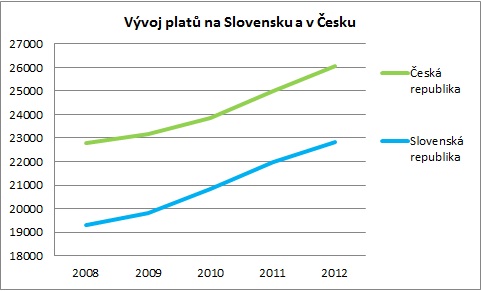Where it pays to work if someone wants to earn good money? In which sectors should people not seek employment if they work maily to make money? These sre questions a current online survey by Platy.cz, Platy.sk, and Fizetesek.hu focused on when comparing salaries in the Czech Republic, the Slovak Republic and Hungary.
People in the Czech Republic earn about 12% more than in the Slovak Republic
According to the salary survey by Platy.sk, the average Slovak gross monthly salary is € 927 including all benefits and commissions employees receive. When converted to the Czech crowns (CZK), the average salary in the Slovak Republic is 23,306 CZK.
According to the survey by Platy.cz, the average monthly salary in the Czech Republic is 26,171 Czech crowns. In both the countries, the online salary survey is based on the same methodology.
In the neighbouring countries where the salary survey is conducted using the same methodology as well, people earn the least in Hungary. Average monthly salary in Hungary is 21,724 Czech crowns.
Chart: Comparison of gross monthly salaries paid in the Czech Republic, the Slovak Republic and Hungary

Source: Platy.cz, Platy.sk, Fizetesek.hu
The highest difference in salaries found in Czech law offices
Compared to the people in the Slovak Republic, the people in the Czech Republic earn more in almost every industry observed. They earn less than Slovaks only when they are working in two specific sectors - non-governmental organizations, civil associations or shared services centers.
It pays to migrate for work from Slovakia to the Czech Republic particular in the following sectors: law offices, education, research and development, postal services and local government. In these sectors, the average monthly salary in the Czech Republic is by a quarter to a third higher than in the Slovak Republic.
Table 1: Average monthly salaries in the Slovak Republic and the Czech Republic and the differences between them
| Sector | Slovak Republic (CZK) | Czech Republic (CZK) | Difference |
| Law offices | 22,099 | 29,755 | 35% |
| Primary and secondary schools, universities | 16,618 | 21,620 | 30% |
| Research and development | 20,515 | 26,447 | 29% |
| Postal services | 15,889 | 20,264 | 28% |
| Local government | 18,529 | 22,890 | 24% |
| Banking, finance | 29,390 | 36,247 | 23% |
Best salaries in IT, banking, telecommunications and shared services centers
Despite the differences in salaries between the neighbouring countries, the sectors when peole earn the most are the same. IT is the best paying industry both in the Slovak Republic and the Czech Republic. In Hungary, people earn more in telecommunications than in IT.
The Slovak Republic, the people working in shared services centers (31,602 CZK) and telecommunications (31,527 CZK) earn only slightly less than those working in IT (35,273 CZK).
In the Czech Republic, IT (36,895 CZK) is followed by banking and finance (36,247 CZK) and telecommunications (34,393 CZK).
The three most-paying industries in Hungary are telecommunications (33,280 CZK), IT (33,130 CZK) and banking, finance (30,463 CZK).
The bottom of the scale is also alike in all the three countries. people ear the less in the sectors of social care, restaurants, bars, canteens, postal services, hotels, guesthouses, hostels and textile, clothing and leather production.
Twenty years after the split of Czechoslovakia, the Slovak people earn more than their colleagues in the Czech Republic only in 16 positions
When travelling to foreign countries to work, Slovaks travel most often to the Czech Republic. The main difference that persists between the two countries is the unemployment rate which has been substantially lower in the Czech Republic for a long period.
Average salaries in the Czech Republic are persistently higher compared to Slovakia. In recent years, however, Slovakia managed to lower this difference a bit. According to the nominal salaries of the respondents to the online survey can fill on www.platy.cz, the average gross salary in the Czech Republic has increased by 14% since 2008, while in the Slovak Republic, it has rosed by 18%.



